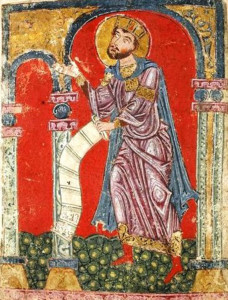Note: On Fridays, you can find me at Your Daily Tripod, owned by my friend TonyD. A longer version of the post below appears there.
David loved God. There can be no question of that. He messed up, royally messed up, on more than one occasion. Yet his love was lived out on an equally large scale: in his confidence the Lord would protect him in the face-off against Goliath, in the beautiful psalms that he wrote for the Father, in the delivery of the Ark of the Covenant. We learn in Sirach 47 that David :
daily had (God’s) praises sung; he set singers before the altars and by their voices he made sweet melodies, he added beauty to the feasts and solemnized the seasons of each year so that when the Holy Name was praised, before daybreak the sanctuary would resound.
David understood that people were watching him as a warrior and a ruler and a follower of the Lord, and attempted to live in a way pleasing to the Lord. Often, he succeeded. David also understood that some outward evidence of faith and praise—the music of his psalms, the beauty of the feasts, the resounding of the sanctuary—would not only reinforce and unite the believers but attract the curiosity of those who had not yet come to God. People respond that way to beauty; it stirs our souls, and once we’ve found it, we want more of it.
What exactly were those “rights of royalty” bestowed on David by the Lord mentioned in Sirach 47? His kingship, certainly. But I’d like to think it was more than that, that it included the honor and responsibility to introduce others to God and to reflect the joy of life with him to all. The honor and responsibility didn’t end with David, or John the Baptist or Jesus, for that matter. In that way, we all have been blessed with the rights of royalty.

King David was given a covenant with God spelled out by the Prophet Nathan in 2 Samuel 7:5-17:
“Go and tell my servant David, ‘Thus says the LORD: Would you build me a house to dwell in? I have not lived in a house since the day I brought up the people of Israel from Egypt to this day, but I have been moving about in a tent for my dwelling. In all places where I have moved with all the people of Israel, did I speak a word with any of the judges of Israel, whom I commanded to shepherd my people Israel, saying, “Why have you not built me a house of cedar?”‘ Now, therefore, thus you shall say to my servant David, ‘Thus says the LORD of hosts, I took you from the pasture, from following the sheep, that you should be prince over my people Israel. And I have been with you wherever you went and have cut off all your enemies from before you. And I will make for you a great name, like the name of the great ones of the earth. And I will appoint a place for my people Israel and will plant them, so that they may dwell in their own place and be disturbed no more. And violent men shall afflict them no more, as formerly, from the time that I appointed judges over my people Israel. And I will give you rest from all your enemies. Moreover, the LORD declares to you that the LORD will make you a house. When your days are fulfilled and you lie down with your fathers, I will raise up your offspring after you, who shall come from your body, and I will establish his kingdom. He shall build a house for my name, and I will establish the throne of his kingdom forever. I will be to him a father, and he shall be to me a son. When he commits iniquity, I will discipline him with the rod of men, with the stripes of the sons of men, but my steadfast love will not depart from him, as I took it from Saul, whom I put away from before you. And your house and your kingdom shall be made sure forever before me. Your throne shall be established forever.'” In accordance with all these words, and in accordance with all this vision, Nathan spoke to David. (2 Samuel 7:5-17 ESV).
David himself spoke about this covenant in Psalm 110:
The LORD says to my Lord: “Sit at my right hand, until I make your enemies your footstool.” The LORD sends forth from Zion your mighty scepter. Rule in the midst of your enemies! Your people will offer themselves freely on the day of your power, in holy garments; from the womb of the morning, the dew of your youth will be yours. The LORD has sworn and will not change his mind, “You are a priest forever after the order of Melchizedek.” The Lord is at your right hand; he will shatter kings on the day of his wrath. He will execute judgment among the nations, filling them with corpses; he will shatter chiefs over the wide earth. He will drink from the brook by the way; therefore he will lift up his head. (Psalm 110:1-7 ESV)
We are about David’s status before God, in part, because his status was a model for Christ and, by inference, for us.